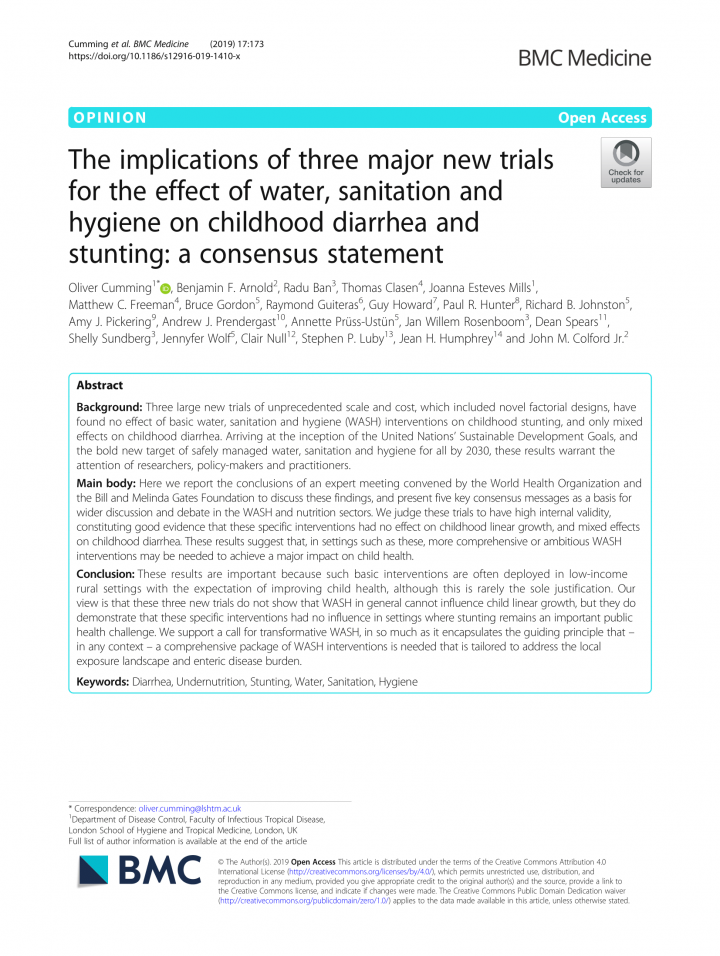The implications of three major new trials for the effect of water, sanitation and hygiene on childhood diarrhea and stunting - a consensus statement
Cumming, O., Arnold, B. F., Ban, R., Clasen, T., Esteves Mills, J., Freeman, M. C., Gordon, B., Guiteras, R., Howard, G., Hunter, P. R., Johnston, R. B., Pickering, A. J., Prendergast, A. J., Prüss-Ustün, A., Rosenboom, J. W., Spears, D., Sundberg, S., Wo (2019)

Published in: 2019
Pages: 9
Publisher:
BMC Medicine, Volume 17, Article number: 173, DOI:10.1186/s12916-019-1410-x
Author:
Cumming, O., Arnold, B. F., Ban, R., Clasen, T., Esteves Mills, J., Freeman, M. C., Gordon, B., Guiteras, R., Howard, G., Hunter, P. R., Johnston, R. B., Pickering, A. J., Prendergast, A. J., Prüss-Ustün, A., Rosenboom, J. W., Spears, D., Sundberg, S., Wo
Uploaded by:
SuSanA Admin
Partner profile:
common upload
1338 Views
17 Downloads
Location of library entry
Background:
Three large new trials of unprecedented scale and cost, which included novel factorial designs, have found no effect of basic water, sanitation and hygiene (WASH) interventions on childhood stunting, and only mixed effects on childhood diarrhea. Arriving at the inception of the United Nations’ Sustainable Development Goals, and the bold new target of safely managed water, sanitation and hygiene for all by 2030, these results warrant the attention of researchers, policy-makers and practitioners.
Main body:
Here we report the conclusions of an expert meeting convened by the World Health Organization and the Bill and Melinda Gates Foundation to discuss these findings, and present five key consensus messages as a basis for wider discussion and debate in the WASH and nutrition sectors. We judge these trials to have high internal validity, constituting good evidence that these specific interventions had no effect on childhood linear growth, and mixed effects on childhood diarrhea. These results suggest that, in settings such as these, more comprehensive or ambitious WASH interventions may be needed to achieve a major impact on child health.
Conclusion:
These results are important because such basic interventions are often deployed in low-income rural settings with the expectation of improving child health, although this is rarely the sole justification. Our view is that these three new trials do not show that WASH in general cannot influence child linear growth, but they do demonstrate that these specific interventions had no influence in settings where stunting remains an important public health challenge. We support a call for transformative WASH, in so much as it encapsulates the guiding principle that – in any context – a comprehensive package of WASH interventions is needed that is tailored to address the local exposure landscape and enteric disease burden.
Bibliographic information
Cumming, O., Arnold, B. F., Ban, R., Clasen, T., Esteves Mills, J., Freeman, M. C., Gordon, B., Guiteras, R., Howard, G., Hunter, P. R., Johnston, R. B., Pickering, A. J., Prendergast, A. J., Prüss-Ustün, A., Rosenboom, J. W., Spears, D., Sundberg, S., Wo (2019). The implications of three major new trials for the effect of water, sanitation and hygiene on childhood diarrhea and stunting - a consensus statement. BMC Medicine, Volume 17, Article number: 173, DOI:10.1186/s12916-019-1410-x
Filter tags
East Asia & Pacific English Sub-Saharan Africa















